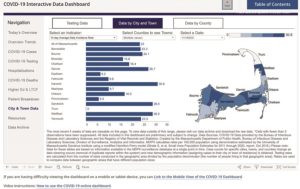WELLFLEET — Town officials imposed an indoor mask order for the second time on Nov. 17, after a meeting at which the police chief cautioned that the on-again, off-again orders were contributing to pandemic stress and that some people were “losing it.”
At the end of the online meeting, board members’ own stress was apparent as tempers flared.
The board of health and the select board voted jointly that evening to order mask-wearing in public indoor spaces indefinitely (though diners may still remove their masks when seated inside restaurants). Violation of the order is not a criminal offense, but fines of $100 to $300 can be assessed for repeated defiance.
Board of health chair Ken Granlund voted against the order, saying he has always been opposed to mask mandates.
Health board members Janet Drohan and Nick Picariello voted for it. Two members of the board, Deborah Freeman and Gary Locke, did not attend the virtual meeting. On the select board side, Helen Miranda Wilson, John Wolf, and Chair Ryan Curley voted for the order, while Janet Reinhart abstained and Mike DeVasto, who was driving, lost phone reception before the vote.
Their decisions followed a report by Wellfleet Health and Conservation Agent Hillary Greenberg-Lemos on the rising number of Covid-19 cases in Wellfleet.

Virus testing data from the state Dept. of Public Health as of Nov. 18 showed that, at 28.5, Wellfleet had the second highest 14-day average incidence rate in Barnstable County. Only Harwich, at 30.6, was higher. The 14-day average incidence rates of other Outer Cape towns were markedly lower: 6.2 in Eastham, 5.5 in Provincetown, and zero in Truro.
As of Nov. 17, when the two boards met, Wellfleet had 11 cases. More than half involved vaccinated residents, Greenberg-Lemos said. Five of the cases were in two households, and the other six were in separate homes, for a total of eight households dealing with infections.
“It doesn’t appear that these folks are transmitting out in the community wildly because half our cases are within two households,” Greenberg-Lemos said.
Drohan said the rising case count warranted a mask mandate, even though, as Greenberg-Lemos said, it wouldn’t affect gatherings in private homes.
“Unfortunately,” the health agent said, “no matter what we do with a mask mandate or a mask advisory, we are not going to stop gatherings and parties where we are seeing the actual transmission.”
Wellfleet, like many other towns throughout the state, has been yo-yoing between mandates and less strict advisories all fall.
The mandate-to-advisory dance, added to everything else about the Covid-19 pandemic, has created an emotional pressure cooker, said Police Chief Michael Hurley.
The pandemic is worsening “mental health issues, substance abuse, anxiety, and stress,” Hurley said. “I think some of the mask on, mask off is contributing to it.”
Whatever happens, he said, a question to consider is “how do we advance this to the next step to tamp down some of this anxiety.”
A year ago, people appreciated the attention to detail on the mask rules and health advisories, said Hurley. But lately, he said, judging from social media, “the postings are getting a little gnarly.”
Comments include “Leave me alone. You know what: I’m vaccinated. Let’s move forward,” the chief said.
The other day, Hurley reported, the police received a 911 call “where a confrontation ensued when one party spit on another, claiming they had Covid. I mean, it’s real and it’s out there in the community. I don’t have all the answers, but I just want to throw that perspective out there tonight.”
Curley said going back and forth with mandates based on small shifts in data is not good policy. He argued for imposing the mask mandate indefinitely and requiring a joint meeting of the board of health and the select board to change it.
Wolf said setting a mask mandate at least through the holidays made sense.
“Does it mean that businesses are going to remind people? Yes,” Drohan said. “But it does not mean that the high-risk situations are going to have any more compliance.”
In the end, Drohan said, the two boards needed to come up with ways to educate people to make the right personal decisions.
Personal choice stood at the heart of Granlund’s argument against reinstating the order.
“Truthfully, I’m not in favor of a mask mandate,” Granlund said. “I never have been. I’m not sure why we can’t allow people to have their own personal responsibility instead of forcing something upon the populace. Like the chief said, people are losing it. You have kids that don’t see people smile.”
“In a pandemic like this, I don’t know if we can depend on personal responsibility,” said Picariello. “I think someone has to take leadership and provide guidance, because the stakes are too high.”
Granlund also objected to requiring a joint meeting to remove the mask order.
“I don’t want to have to come back to the select board to do this kind of meeting again,” he said.
To which Curley replied, “I mean — respectfully — tough.”
When the health board members voted two to one in favor of the order, with Granlund in dissent, he announced, “It fails.”
Several board members had to explain to him that the majority rules.
Curley then said, “I think you need to reassess who is your chair.”
At that point, Granlund responded with vulgarities, and said, “I think I am going to resign.”
“Well, good, we don’t need this kind of leadership,” said Wolf.
Following the meeting, Granlund did not respond to a request for comment. As of press time, it was not clear if he was still a member of the board of health.
